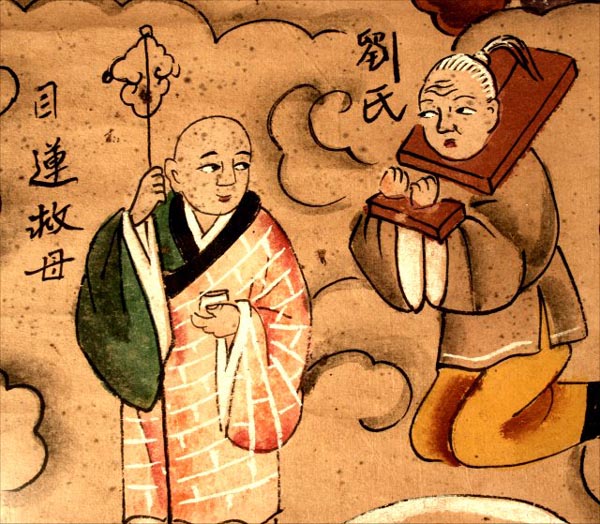 |
| Mulian and his mother (Wikipedia) |
Note: Buddhist across many cultures celebrate a holiday in remembrance of their ancestors, sometimes called the "Hungry Ghost Festival." There are many, many other observances, too.
Get Ready: Do you do anything formal to remember your ancestors? Perhaps commemorate their birthdays or dates of death?
In Lesson #05-009, we looked at Buddhist holidays celebrating three momentous occasions in the life of the historic Buddha: his birth, his attainment of enlightenment, and his death. Here are some other holidays observed in various Buddhist traditions.
One of the best known is the Festival of Hungry Ghosts. It has its roots in Ullambana, an ancient observance in remembrance of the ancestors. Even before it became associated with this, the fifteenth day of the seventh month was called "The Buddha's Joyful Day," perhaps because it marked the end of the Rainy Season retreat, the day when monks were again free to wander.
Tradition says that on that day, the Buddha instructed his disciple Maudgalyayana (Chinese Mulian) on how to obtain release from hell for his deceased mother. This discourse is called the Ullambana Sutra, and the story gave rise to the Chinese folk tale, "Mulian Rescues His Mother."
Ullambana evolved into the elaborate "Ghost Festival" observances now seen in the seventh lunar month. In south Asian countries, it is a time for lay people to make donations to monks, especially the giving of new robes. Any "merit" they earn through these gifts is then dedicated to the benefit of the hungry ghosts, or preta.
--------
There are many other festivals associated with events in the Buddha's life, including the Ploughing Festival and the Elephant Festival.
The Ploughing Festival celebrates the beginning of the planting season in spring (not unlike Plough Sunday and Monday, as seen in Lesson #05-002). Still conducted in Thailand and Cambodia, it involves the king driving a pair of sacred oxen pulling a plough. In the stories of the Buddha, it was while the young prince watched the oxen struggling as his father performed this ceremony that he had his first inkling of the suffering of life.
The Elephant Festival (not to be confused with another festival by that name in Jaipur, India) is something like a "Teacher's Day." The Buddha once explained that a wild elephant is trained by yoking it with one that is already tame. So a new Buddhist should associate with a more experienced one. This is recognized in some places on the third Saturday in November.
--------Read more:
- The Festival of Hungry Ghosts: https://en.wikipedia.org/wiki/Ghost_Festival
- Ploughing Festival: https://en.wikipedia.org/wiki/Royal_Ploughing_Ceremony
Practice: Match the term to its definition below:
- deceased
- discourse
- inkling
- lay people
- merit
- momentous
- oxen
- plough
- retreat
- yoking
- benefit derived from performing good actions
- cows used for heavy labor
- those who are not monks or nuns
- dead
- of great importance
- connecting; tying together
- withdrawal from the world for contemplation
- formal speech
- hint; clue; vague idea
- device used for "cutting" the earth to plant seeds
Answers are in the first comment below.
Submitted to the Shenzhen Daily for February 27, 2017


Answers to the Practice: 1. d; 2. h; 3. i; 4. c; 5. a; 6. e; 7. b; 8. j; 9. g; 10. f
ReplyDelete